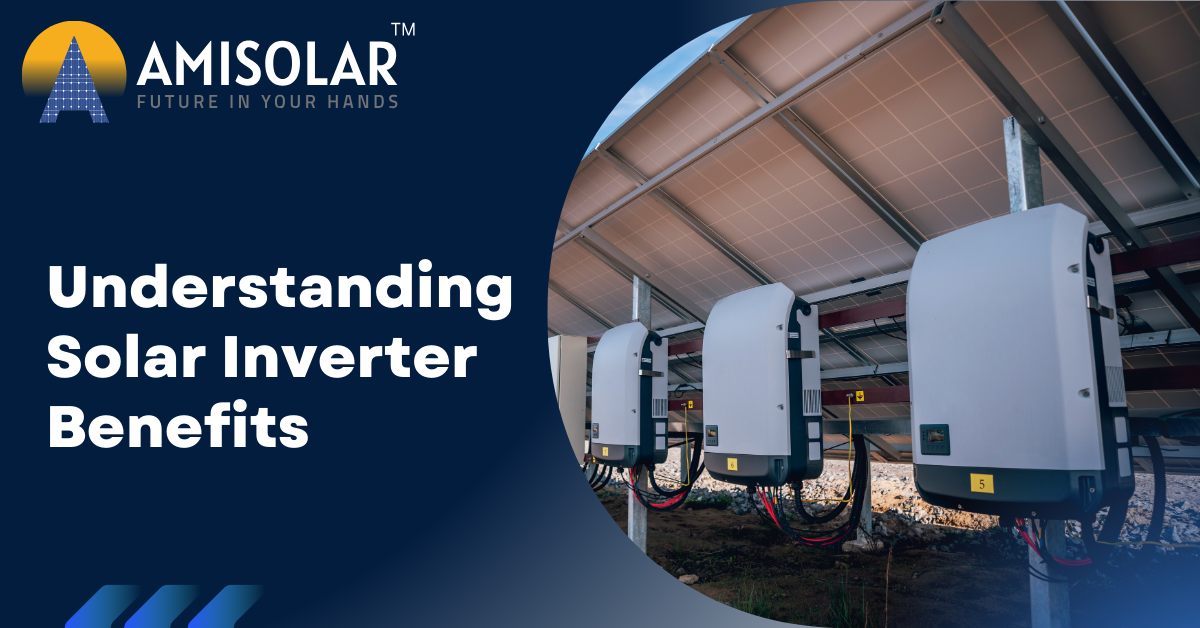Solar inverters are important for using solar energy well. Let's talk about why they're so…

Solar energy is becoming increasingly popular as a sustainable and cost-effective alternative to traditional energy sources. A critical component of a solar power system is the solar inverter, which plays a pivotal role in converting the energy harnessed from the sun into usable electricity. This blog will explore the benefits of solar inverters, highlighting their importance and functionality. We will also introduce Amisolar, a prominent solar inverter manufacturing company in India.
What is a Solar Inverter?
A solar inverter is a device that converts direct current (DC) generated by solar panels into alternating current (AC), which is the standard electrical current used by most household appliances and the electrical grid. Without a solar inverter, the energy produced by solar panels would be unusable for most applications.
Key Benefits of Solar Inverters
Enhanced Energy Conversion Efficiency
Solar inverters are designed to maximize the energy output from solar panels by ensuring efficient conversion from DC to AC. This efficiency translates to more electricity being generated and used, reducing reliance on the grid and lowering electricity bills.
Grid Connectivity
One of the primary benefits of solar inverters is their ability to connect solar power systems to the electrical grid. This allows for the seamless transfer of surplus energy back to the grid, often resulting in credits or payments from utility companies under net metering policies.
Monitoring and Management
Modern solar inverters come equipped with advanced monitoring capabilities, allowing users to track the performance of their solar power systems in real time. This feature helps in identifying and troubleshooting issues promptly, ensuring optimal system performance.
Improved System Reliability
Solar inverters contribute to the overall reliability of solar power systems. They are designed to handle fluctuations in solar energy production due to changing weather conditions, ensuring a consistent and stable power supply.
Smart Technology Integration
Many solar inverters now include smart technology features, such as remote monitoring and control via mobile apps. These features provide users with greater control over their energy usage and system performance, enhancing convenience and efficiency.
Environmental Benefits
By facilitating the use of solar energy, solar inverters play a crucial role in reducing carbon footprints and promoting environmental sustainability. Solar power is a clean and renewable energy source that helps mitigate the adverse effects of fossil fuels.
Introducing Amisolar: A Leading Solar Inverter Manufacturer
Amisolar is a renowned solar inverter manufacturing company based in India, known for its high-quality and innovative products. The company specializes in designing and producing a wide range of solar inverters that cater to various applications, from residential to commercial and industrial.
Why Choose Amisolar?
Quality and Reliability: Amisolar’s inverters are built with precision and undergo rigorous testing to ensure durability and reliable performance.
Advanced Technology: Amisolar integrates the latest technological advancements into their inverters, providing users with top-notch performance and efficiency.
Comprehensive Support: The company offers extensive customer support and service, ensuring that users have a seamless experience from installation to maintenance.
Frequently Asked Questions
What is a Solar Inverter and Why is it Important?
A solar inverter is a device that converts the direct current (DC) generated by solar panels into alternating current (AC), which is the form of electricity used by most household appliances and the electrical grid. It is crucial for making the energy produced by solar panels usable for everyday applications.
How Does a Solar Inverter Improve Energy Efficiency?
Solar inverters maximize the energy output from solar panels by ensuring efficient conversion from DC to AC. This increased efficiency means more electricity is generated and utilized, reducing dependence on the grid and lowering electricity bills.
Can Solar Inverters Connect to the Electrical Grid?
Yes, one of the primary benefits of solar inverters is their ability to connect solar power systems to the electrical grid. This allows for the seamless transfer of surplus energy back to the grid, often resulting in credits or payments from utility companies under net metering policies.
What Monitoring Capabilities Do Solar Inverters Offer?
Modern solar inverters come with advanced monitoring capabilities, allowing users to track the performance of their solar power systems in real time. This feature helps in promptly identifying and troubleshooting issues, ensuring optimal system performance.
Are Solar Inverters Reliable?
Yes, solar inverters contribute significantly to the overall reliability of solar power systems. They are designed to handle fluctuations in solar energy production due to changing weather conditions, ensuring a consistent and stable power supply.
Do Solar Inverters Integrate with Smart Technology?
Many solar inverters now include smart technology features, such as remote monitoring and control via mobile apps. These features provide users with greater control over their energy usage and system performance, enhancing convenience and efficiency.
How Do Solar Inverters Benefit the Environment?
By facilitating the use of solar energy, solar inverters help reduce carbon footprints and promote environmental sustainability. Solar power is a clean and renewable energy source that helps mitigate the adverse effects of fossil fuels.
Conclusion
Solar inverters are indispensable components of solar power systems, offering numerous benefits such as enhanced energy efficiency, grid connectivity, and improved system reliability. Amisolar stands out as a leading manufacturer, delivering high-quality solar inverters that meet diverse energy needs. By choosing solar inverters from reputable companies like Amisolar, users can harness the full potential of solar energy, contributing to a more sustainable and eco-friendly future.

